
News for 2019
Congratulations, Rena Xian!
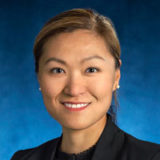
On December 2, 2019, Dr. Rena Xian, assistant professor of Pathology and Oncology at the Johns Hopkins University School of Medicine received the Johns Hopkins Center for AIDS Research (CFAR) Scholar Award at the CFAR World AIDS Day event held in the Bloomberg School of Public Health for her project, "Comprehensive Mutational Analysis of HIV Associated Classical Hodgkin Lymphoma, and its Relationship to Tumor Immune Microenvironment and Epstein-Barr Virus."
The CFAR Scholar Award is a biannual annual pilot grant of up to $50,000 that enables and supports HIV/AIDS research projects. The primary purpose of these awards is to strengthen the individual's ability to secure independent NIH research funding with foci on R- and K-series awards.
Congratulations, Dr. Eric Gehrie!
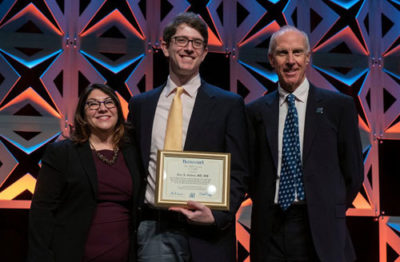
Dr. Eric A. Gehrie, from the Division of Transfusion Medicine, accepted the AABB RISE award on behalf of all authors who contributed to the original manuscript "Blood utilization and mortality in victims of gun violence", which was published in the October 2018 edition of TRANSFUSION. This award, which "honors the authors of the best original research article published each year in TRANSFUSION" was presented on October 19th, 2019 at the annual meeting of the AABB in San Antonio, Texas. The findings of the article - that victims of gunshot wounds require 10 times as much blood and are 14 times more likely to die compared to victims of other mechanisms of trauma - had previously been featured in an online video produced by Johns Hopkins Medicine. In addition, Dr. Gehrie had previously presented the findings at the 2018 AABB annual meeting in Boston, MA.
Congratulations, Dr. Kohei Fujikura!
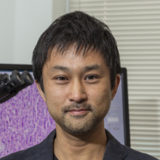
Kohei Fujikura, M.D., Ph.D. has been selected as the third Sol Goldman Fellow in Pancreatic Cancer Research in the Department of Pathology at the Johns Hopkins University School of Medicine. Kohei received his B.S. in Biology from the University of Tokyo in Tokyo, Japan. He then went on to earn both his M.D. and Ph.D. degree from the Kobe University School of Medicine in Kobe, Japan. He is a clinical pathologist with a special interest in pancreatobiliary cancers and their precursor lesions. He joined the Wood lab as a postdoctoral fellow in 2018, and his current projects investigate the genetic and cellular events of pancreatic tumorigenesis. In addition, he also focuses on morphological analysis of the pancreatobiliary cancers after neoadjuvant chemotherapy.
New research center to serve as hub for immunology and engineering research
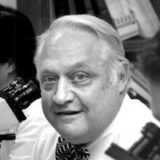
It is with sadness that we learned of the passing of our long-time friend and colleague Dr. David Page. David graduated from the Johns Hopkins School of Medicine and in 1971 served as our Chief Resident in Pathology. In 1973 he joined the faculty at Vanderbilt Medical Center. David made a number of seminal contributions to the field of breast pathology. Over the years, members of our faculty often relied on David for his expert consultation on difficult breast pathology cases. He was also a gifted teacher and a much loved friend of our department. He will be missed.
2019 Nobel Prize Winner
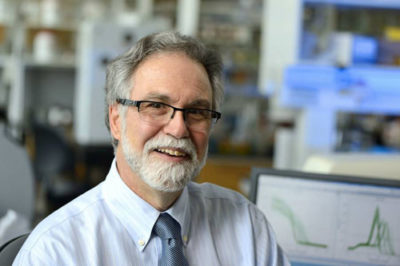
Congratulations to Dr. Gregg Semenza- one of the winners of the 2019 Nobel Prize in physiology or medicine! Gregg is on the faculty here at Johns Hopkins, and he was awarded the prize for his discoveries of how cells sense and adapt to changes in oxygen concentrations. This is important for pancreas tumors, because it turns out that one of the tumors that arises in the pancreas, serous cystadenoma, is caused by a mutation in the VHL gene, and VHL is one of the genes that Gregg has shown is important in sensing and responding to changes in cellular oxygen levels.
Congratulations Gregg!
Pathology Trailblazers
Congratulations to our faculty Drs. Elizabeth Montgomery, Jonathan Epstein and Paul van Diest (Adjunct Professor), who are featured in the September 2019 issue of the Pathologist honoring 100 inspirational and influential trailblazers in the profession! This group was selected after months of collating reader nominations and judging by an expert panel. To see the full list, go to https://thepathologist.com/power-list/2019.
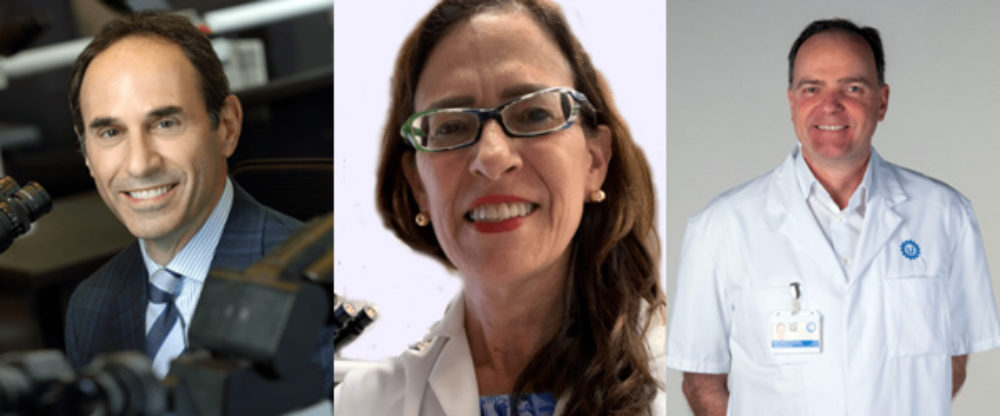
Congratulations, Brian Parkinson!
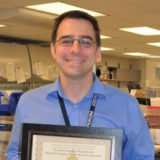
On September 9, 2019, Brian Parkinson, the staff assistant of the Medical Microbiology Division received the prestigious Baker-King Award at a ceremony held in the Turner Auditorium. The Baker-King Award is an annual award given by The Johns Hopkins Hospital to employees who excel in their job performance and demonstrate exemplary customer relations, self-management, teamwork, accountability, and continuous performance improvement.
Microbiology Supervisor Melissa Geahr describes Brian as well-organized, trustworthy, and eager to gain knowledge as it relates to Microbiology, and able to handle any amount of work with ease. "Brian maintains a good relationship with the staff members and always has a friendly attitude. This is important when you are the first person you see when you walk into the front office every day. His positive attitude just complements his exceptional service," she remarked. Dr. Karen Carroll, Director of Medical Microbiology Division added, "All of the Microbiology faculty agree that Brian's work ethic, efficiency and skill with multi-tasking allow them to better focus on patient care and research."
Congratulations, Brian, from the Department of Pathology. Very well done!
Hopkins University Scientists win $1 million Keck Foundation Grant
Researchers from Johns Hopkins School of Medicine in the USA led by Dr. Abdel Rahim Hamad has won a prestigious $1 million grant award from The W.M. Keck Foundation of Los Angeles in the USA. The Hopkins team is one of only five researchers in the USA who have won this award in July 2019. The three-year grant will be used to; (1) Define the identity of the X cell, which is a new lymphocyte that is a hybrid between the B and T cells. (2) Analyze their role in the pathogenesis of type 1 diabetes, which is an autoimmune disease that strikes early in life and destroys beta cells of islets Langerhans, the only source of insulin in the body. There is no cure for type 1 diabetes and patients depend on insulin replacement therapy for survival.
Discovery of X cells was very surprising to scientists in the field of immunology as it has long been thought that T cell and B cells are the only cell types of the adaptive immune cells. The discovery of X cells thus opens new areas of research particularly in the field of autoimmunity and lays the foundation for answering key questions that have been elusive for understanding using current paradigms.
The W.M. Keck Foundation was established in 1954 by William Myron Keck, founder of the Superior Oil Company, with the goal of generating far-reaching benefits for humanity. The program seeks to fund high-risk/high-impact work by researchers with the potential to lay the groundwork for new paradigms, technologies, and discoveries that will save lives, provide innovative solutions and add to our collective understanding of the world. To make grant determinations, the Foundation relies upon a wide range of input, including assessments by its professional staff, site visits (where appropriate), peer reviews, the latest available scientific information, and presentations by experts in scientific, medical and health and human service fields. Usually top universities in USA are invited to nominate three researchers for the award. Universities select three strong proposals from a pool of internal competitors and then Keck foundation selects one application for a final phase of the national competition. Selected applicants and their respective teams give presentations to the Keck award committee which then selects and recommends top applicants to the board of trustees who select winners.
The Johns Hopkins include collaborators from Harvard University, Columbia University, IBM, Des Moines University and University of Colorado.
Related sites:
Congratulations, Dr. Barbara Detrick!
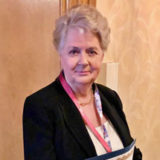
Barbara Detrick, Ph.D., Professor of Pathology and Medicine with a joint appointment in Molecular Microbiology and Immunology, Bloomberg School of Public Health, was honored with the 2019 AMLI Distinguished Service Award at the Association of Medical Laboratory Immunologists (AMLI) Meeting held in Cleveland in August 2019. Dr. Detrick was acknowledged for her extraordinary contributions, dedication and leadership to the AMLI society and for her outstanding accomplishments in the field of clinical laboratory immunology. Congratulations, Dr. Detrick!
New iPad App On Renal Transplant Pathology
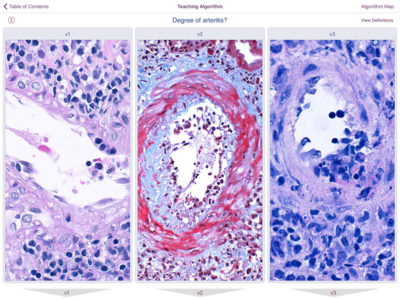
We have just released our 7th iPAD teaching app! The Johns Hopkins Atlas of Renal Transplant Pathology is designed to teach residents, fellows, and practicing pathologists the basic pathologic lesions in the kidney allograft. The diagnostic entities covered by the Atlas are not limited to rejection but also include recurrent glomerulopathies, infections and other diseases that may affect transplanted kidneys. The diagnostic approach to rejection follows the Banff criteria in the latest version (2017 at the time of this writing). The Banff definitions and rules, Banff scoring system, and Banff classification of rejection are available in text format for easy consultation. The images collected in this Atlas include high resolution examples of light microscopy, immunofluorescence, immunohistochemistry and electron microscopy features of individual diseases. Annotations with comments and references to definition, scoring and classification categories are also included for each i mage. Th ree teaching algorithms are provided for navigating through the combination of features leading to diagnosis of specific types of rejection or other conditions unrelated to rejection. These algorithms cover: (1) T-cell mediated rejection, (2) antibody-mediated rejection and (3) other tubular and interstitial pathologic changes. A set of representative images, each with multiple choice quiz can be used for self-test. This app, for iPADs only, is available in the iTunes store. (sorry, because of costs we can only offer it on one platform)
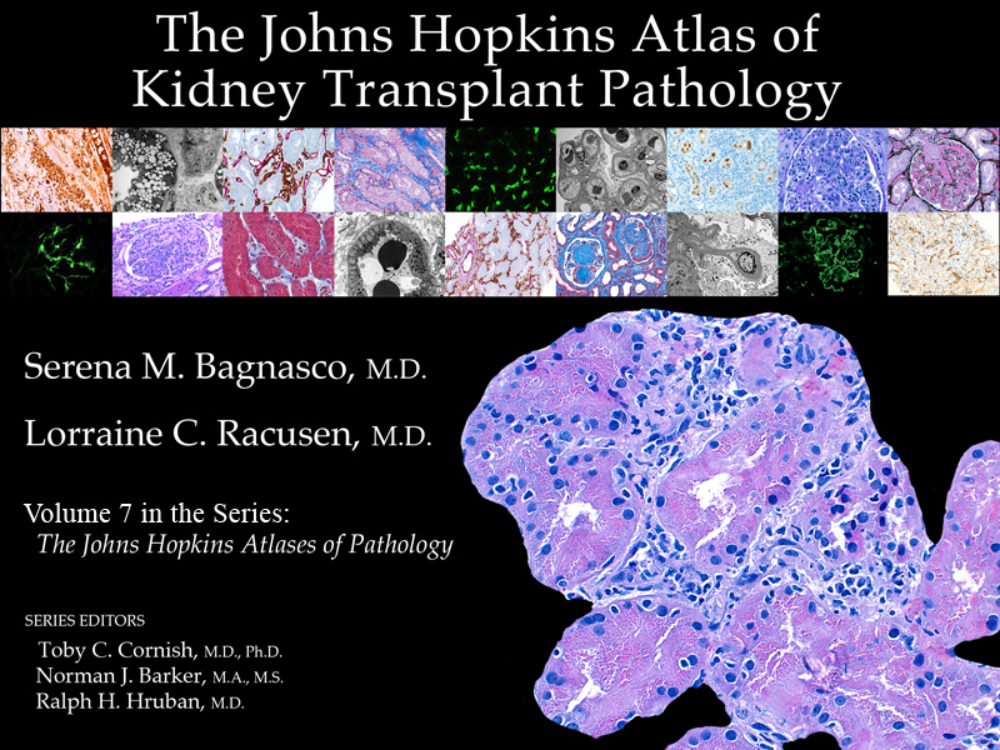
Hopkins Pathology Residency Ranked #1
Doximity just came out with its new 2019-2020 year rankings of residency training programs, and Hopkins Pathology is ranked #1 for the second year in a row. While such rankings reflect the popularity of a program more than a substantive review, we are gratified to see our program recognized by our peers, and we are profoundly proud of the quality and achievements of our residents.
Congratulations, Alisha Ware!
Our 4th year resident Alisha Ware was awarded the "2019 APC Inspiration Award" at the 52nd annual meeting of the Association of Pathology Chairs in Boston, MA. Alisha gave a platform and a poster presentation entitled, "The 'Race' Towards Diversity, Inclusion, and Equity in Pathology: The Johns Hopkins Experience." This team effort hopes to increase diversity in pathology at the resident and faculty levels. Congratulations Alisha!
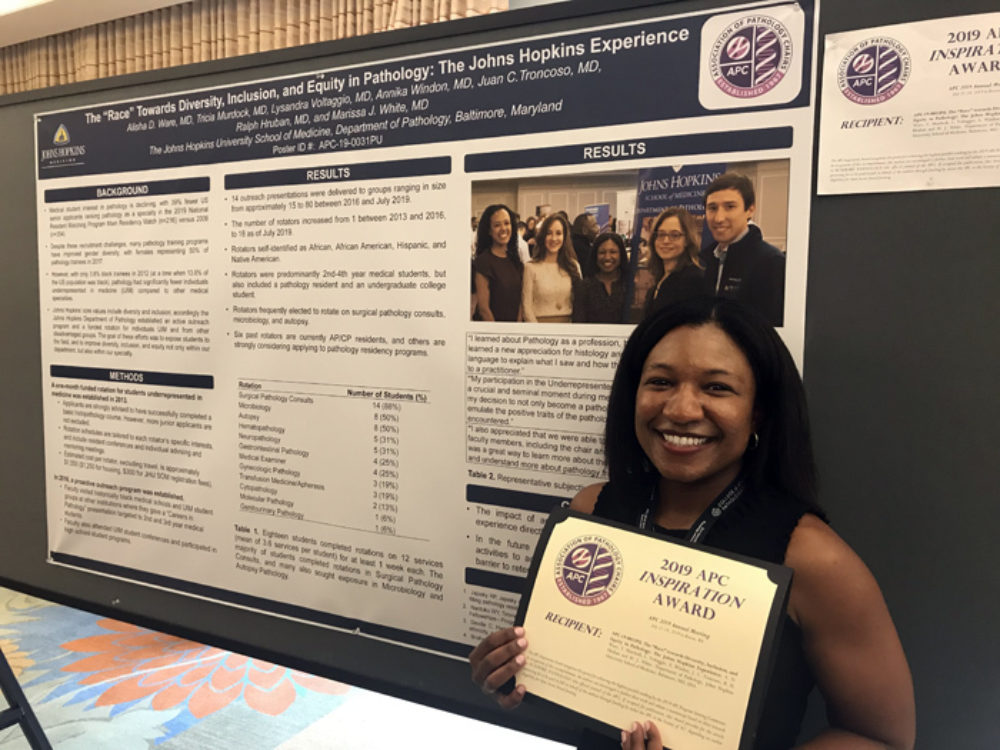
New iPad App On Thyroid Pathology
We just released our latest iPAD App - it is a beautifully illustrated application (APP) for the iPAD.
The Johns Hopkins Atlas of Thyroid Pathology is the sixth teaching app in our series from the Johns Hopkins University Department of Pathology. This app is designed to teach residents, fellows, and practicing pathologists the assessment of thyroid fine needle aspiration specimens with histologic correlation. The APP includes numerous examples of common entities, such that viewers can experience the variety of morphologies associated with each entity, as well as rare entities.
The app is composed of four modules: an interactive teaching algorithm, a searchable image atlas, an image-based quiz, and a flash card module. Viewing multiple examples of the same entity or feature from this large, rich image atlas will strengthen your diagnostic skills and updated you on key concepts in the area of thyroid cytopathology and pathology.
Teaching Algorithm: The teaching algorithm is based on the assessment of cytomorphologic features to arrive at a diagnosis. The algorithm consists of a series of dichotomous decision points focusing on current diagnostic concepts involved in the diagnosis of thyroid fine needle aspiration specimens. It is designed with the Bethesda System for Reporting Thyroid Cytopathology in mind, which will help viewers better understand this widely accepted reporting system.
Image Atlas: The image atlas contains over 500 high-resolution color images. The atlas can be viewed by diagnosis, features (these features reinforce the diagnostic features used in the algorithm), and Bethesda System category. In addition to the albums we have provided, you can create your own albums and add images you select from the atlas to these albums.
Quiz: The Quiz contains 50 multiple choice questions for self-study. Keep track of your progress or quiz your friends and family!
Flash Cards: The Flash cards module allows you to view a randomly generated assortment of images from the image bank and subsequently view the diagnosis and caption by simply "flipping" the card over.
(sorry, because of costs we can only offer it on one platform)
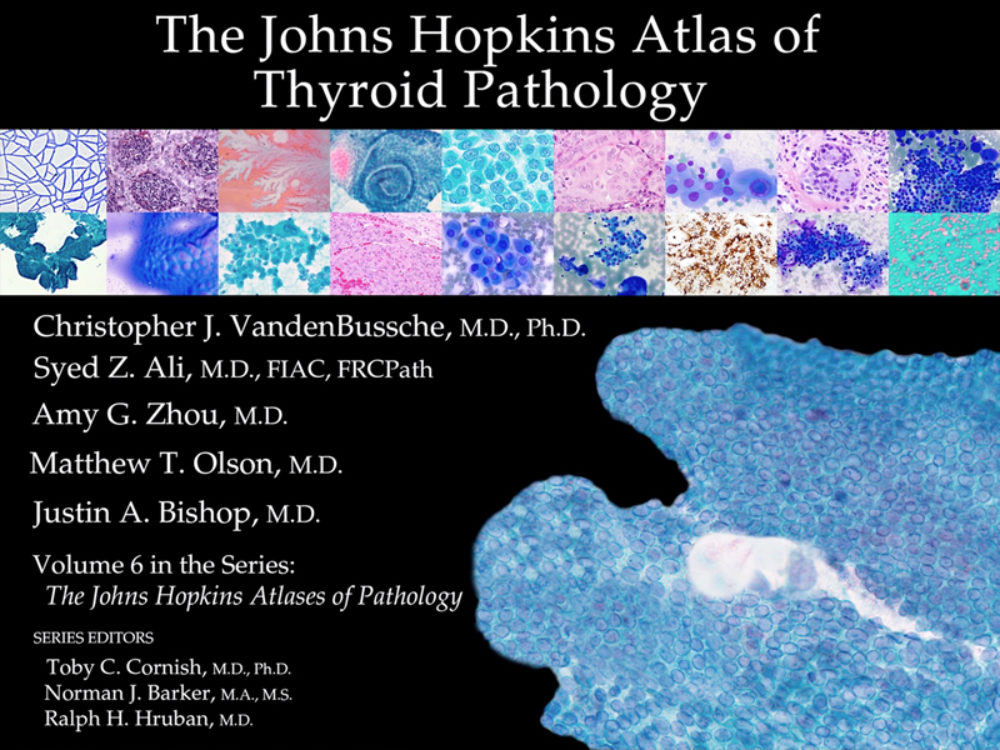
The Department of Pathology welcomes three new faculty!
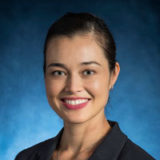
Tatianna Larman, M.D., Ph.D. earned her B.A. in Organismal and Evolutionary Biology from Harvard University. After working in a DNA microarray fabrication start-up company in Italy for two years, she became a medical student at University of California San Diego School of Medicine. During her medical school training, she spent two additional years as a Howard Hughes Medical Institute Medical Fellow in the Harvard Medical School Department of Genetics, where she studied somatic mitochondrial DNA mutations in human cancer.
She then completed residency training in anatomic pathology here at Johns Hopkins, during which she spent a year as a postdoctoral fellow in the Rong Li lab in the Department of Cell Biology, where she studied the relationship of APC mutations and chromosomal instability using in vitro intestinal organoid models. She recently completed the fellowship in GI/Liver Pathology at Johns Hopkins.
Dr. Larman joined the faculty in the Division of GI/Liver Pathology and the Center for Cell Dynamics as a physician-scientist on July 1. She is eager to leverage insights from her clinical efforts in GI pathology to study colonic crypt biology and dissect how perturbations to the pericryptal niche lead to neoplasia.
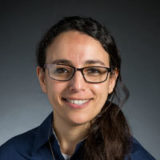
Heba Mostafa, M.D., Ph.D. was born and raised in Egypt where she completed her M.D. at the Alexandria University, Egypt. She then moved to the United States where she earned her Ph.D. at the University of Kansas. Her Ph.D. thesis focused on studying the interplay between viral and cellular factors in herpes simplex virus type 1 infection. From 2017 to 2019, she completed her Clinical Microbiology postdoctoral fellowship training at the University of Rochester Medical Center in Rochester, NY.
On July 1, Dr. Mostafa joined the Division of Medical Microbiology as the Director of the Medical Virology Laboratory.
Dr. Mostafa will build on her successful next-generation sequencing experience to apply viral whole genome sequencing as a diagnostic and research tool. Her research interests include viral surveillance with applications such as understanding viral evolution and monitoring the effect of viral polymorphisms, particularly common primer binding sites, on the sensitivity of diagnostic molecular assays.

Ying Zou, M.D., Ph.D. joined the Division of Molecular Pathology on July 1, and will co-direct the Cytogenetics and Cytogenomics Laboratory with Dr. Denise Batista. Prior to coming to Johns Hopkins, she was Associate Professor and Director of the Clinical Cytogenetic and Genomic Laboratory in the Department of Pathology at the University of Maryland School of Medicine. Dr. Zou received her M.D. from Peking University/Peking Union Medical College in Beijing in 1995, and her Ph.D. in Genetics and Development at UT Southwestern in the labs of Jerry Shay and Woody Wright.
Her Ph.D. work focused on telomere biology, in particular replication and recombination with an emphasis on telomere function in cancer. She completed her clinical cytogenetics fellowship at the Mayo Clinic, and her clinical molecular genetics fellowship at Boston University, where she was also on the faculty and helped run the cytogenetics and molecular genetics laboratories. Following that, she moved to Spokane, Washington to set up new clinical genetics laboratories and genetics training programs.
Dr. Zou will be extending her work on the cytogenetics of cancer, particularly in the hematologic malignancies realm. In addition to clinical service in cytogenetics, she will help build the clinical molecular genetics service in the area of cancer predisposition syndromes. Her educational efforts will include teaching in the newly re-vitalized Lab Genetics and Genomics fellowship.
Heather Cadogan Memorial Service

We are sad to announce the loss of a member of our Hopkins family. Heather Cadogan passed away on July 2, 2019. Heather was a Specimen Accessioning Coordinator in the busy Surgical Pathology Grossing Room. She came to Johns Hopkins Hospital in 2012 and ever since has been one of the smiling faces that you first meet when you enter the Grossing Room on any given day. Heather was a beloved member of our Surgical Pathology team, and she will be dearly missed. A wake will be held at Wylie Funeral Home on Friday, July 12, 2019 from 5:00 pm - 8:00 pm. A funeral service will be held at Holy Family Church in Randallstown, MD on Saturday, July 13, 2019, at 10:30 am.
James R. Eshleman, M.D., Ph.D. to be the inaugural Ralph H. Hruban, M.D. Professor
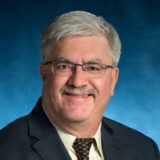
I am pleased to share that the Johns Hopkins University Board of Trustees has approved James R. Eshleman, M.D., Ph.D. to be the inaugural Ralph H. Hruban, M.D. Professor in Pancreatic cancer Research in the Department of Pathology effective July 1, 2019. This newly endowed professorship was funded by private donors.
Jim received both his medical and doctoral degrees from the University of Pennsylvania in 1988. After finishing his internship in internal medicine at Temple University Hospital, he completed a research fellowship and residency training in pathology, as well as a clinical fellowship in transfusion medicine, at the Hospital ofthe University of Pennsylvania. In 1993-1996, Jim completed post-doctoral research training in the laboratory of Sanford D. Markowitz, M.D., Ph.D. at case Western Reserve University. After a brief stint on the faculty at Case, Jim and his wife Sue moved to Johns Hopkins in 1997. Jim was promoted to Associate Professor in 2002 and elevated to the rank of full professor in 2010. He holds a secondary appointment in the Department of Oncology and serves as Associate Director of the Molecular Diagnostics Laboratory.
Since his arrival at Johns Hopkins 22 years ago, Jim has proven himself an impactful scientist, a gifted educator, and a talented clinician. His research focuses on identifying familial pancreatic cancer predisposition genes and identifying better chemotherapeutic agents for pancreatic cancer. In 2013, he was recognized by the American Association for Cancer Research with the prestigious Team Science Award.
In addition to driving cutting edge research in pancreatic cancer, Jim is an exceptional role model, educator, and mentor to trainees and junior faculty alike. During his career at Johns Hopkins, he has trained and mentored more than 25 fellows and doctoral candidates, along with dozens of medical students, residents and graduate students. Three times during his tenure, Jim has received the Johns Hopkins Pathobiology Graduate Program Teaching Award - a recognition bestowed by our program's students.
Jim has received numerous grant awards from the National Institutes of Health and other funding sources, co-authored more than 160 peer-reviewed publications, and authored five book chapters on molecular medicine and the detection of pancreatic cancer.
Simply put, Jim is a consummate researcher, educator, and mentor in the field of pancreatic cancer research. A formal installation ceremony to celebrate will be held in 2020. In the meantime, please congratulate Jim on this wonderful recognition of his many achievements.
Ralph Hruban, MD
Baxley Professor and Director of Pathology
Welcome Incoming Residents!
On July 1st we welcomed 13 new residents to the Department. From left to right, they are: Bart White, Ashleigh Graham, Carla Saoud, Harsimar Kaur, Gabrielle Bailey, Caroline Early, Eitan Halper-Stromberg, Efrain Antonio Ribeiro, Andrew Sohn, Julie Stein, Seena Tabbi, Jason Van Roo, and Matthew Gabrielson. Pictured in the back row are our new Chief Residents, Andrew Layman, Alisha Ware, and Mark Hopkins.

Best Wishes, Dr. Fred Askin!
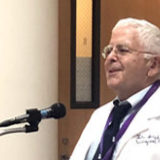
On June 17th the Department wished Frederic (Fred) Askin, M.D. well as he departs for a faculty position at the University of North Carolina. A Virginia native, Fred first came to Hopkins in 1964 as an intern and resident in Medicine (1964-1966). He came back to Hopkins in 1991 and has held a number of leadership roles, including Director of Surgical Pathology (1991-2003) and Chief of Pathology at Bayview (2007-2017). The goodbyes included an amazing gift - a drawing of Fred's dog, standing on books written by Fred, looking into a microscope! Thank you Fred for all you have done for Hopkins, for the Department, for Bayview, for your students and residents, and most of all for your patients! We wish you and Duffy the best in your new adventure!
Congratulations, Dr. Youngran Park!

We are proud to announce that Dr. Youngran Park, a 2017 graduate of the Pathobiology PhD Graduate Program, along with collaborators, has recently had a 1st author paper published in the journal, Clinical Cancer Research entitled: Loss of ARID1A in tumor cells renders selective vulnerability ionizing radiation and PARP inhibitor therapy.
Youngran Park was born in South Korea and received her bachelor's degree at Korea University. Youngran studied the function of ARID1A in ovarian cancer under the mentorship of Drs. Ie-Ming Shih, M.D., Ph.D. and Tian-Li Wang, Ph.D., and received her Ph.D. in Pathobiology from Johns Hopkins University in October, 2017. She had a post-doctoral training under Dr. Eric Raabe, M.D., Ph.D., who focuses on pediatric brain tumor research at JHU. Currently, Youngran is working on brain tumor research at Korea University. She still strongly believes that the spirit of science is to alleviate human suffering through research.
Keep up the great work, Dr. Park!
Hopkins Scientists Discover a New Type of Immune Cell
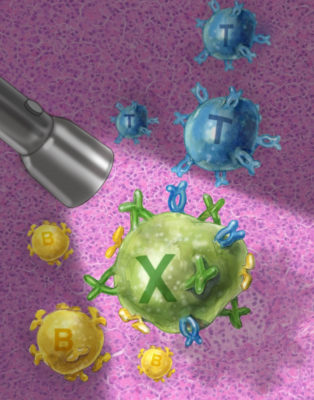
A team of scientists in the Department of Pathology, led by Abdel Rahim A. Hamad, D.V.M., Ph.D., report, in the May 30th advance on-line edition of the journal Cell, the remarkable discovery of a new type of immune cell. Historically T and B cells have been thought of as distinct arms of the immune system, Dr. Hamad and colleagues have discovered a rare cell, that they call the X cell, that has features of both T and B cells. They further show that the newly discovered X cell may play a role in the development of type 1 diabetes. Congratulations to Dr. Hamad and his team on this very exciting discovery!
Click here for the press release.
Click here for the article in Cell.
New Blood Test for Cancer
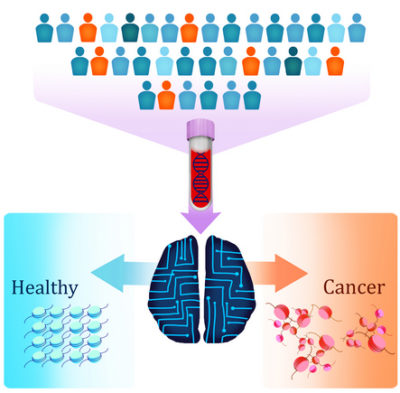
A team of scientists at Johns Hopkins, led by Victor Velculescu, M.D.,Ph.D., report a new approach to a blood test for cancer. Reported in the journal Nature, the test can be used to detect seven different types of cancer, including pancreatic cancer. The test, called "DELFI" (DNA evaluation of fragments for early interception) detects abnormal fragments of DNA in the blood that have been shed by cancer cells. This technique takes advantage of the fact that cancers "package" their DNA differently than normal cells, and this unique packaging leads to unique patterns of DNA fragmentation that can be detected in the blood. DELFI detected close to 75% of cancer patients, and, remarkably, when combined with another blood test, DELFI could detect 91% of cancers.
Congratulations, Dr. Danielle Hutchings!
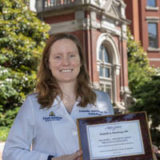
Congratulations to our resident Danielle Hutchings, M.D.! Danielle was awarded the Frank Coulson Jr. Award for Clinical Excellence from the Miller Coulson Academy of Clinical Excellence here at Hopkins. The Miller Coulson Academy of Clinical Excellence recognizes and promotes excellence in patient care at Johns Hopkins for the benefit of the individuals and communities that we serve. The academy recognizes clinically excellent academic physicians who have achieved a level of mastery in communication & interpersonal skills, professionalism & humanism, and negotiation of the healthcare system. Congratulations Danielle!
Congratulations, Dr. Syed Ali!

Dr. Syed Ali was conferred upon the "2019 Maurice Goldblatt award" at the recently held 20th International Congress of Cytology (ICC) in Sydney, Australia (May 5-9, 2019). Goldblatt is the highest and most prestigious international award given at the ICC, which is the 3-yearly scientific meeting of the International Academy of Cytology (IAC), the largest global professional organization in the field of Cytology.
Awarded once a year, the Maurice Goldblatt Cytology Award was inaugurated in 1960 by the late Maurice Goldblatt, the founder and honorary chairman of the Cancer Research Foundation, Chicago. It consists of a gold medal, wall plaque and a cash award.
Dr. Ali gave a short 20-minute acceptance speech following the award ceremony, which was attended by a large international audience.
Below is the caption read at the award ceremony for the audience:
"
The 2019 Maurice Goldblatt Cytology Award - To Syed Z. Ali, MD, FIAC, for his stewardship of the continuing educational activities of the International Academy with vigor and innovative ideas; for his successful efforts to develop, test and introduce novel techniques in the practice of clinical cytology; for his dedication in the education of young cytopathologists from around the world at home and abroad.
Sydney, Australia
May 2019
Graduation Dinner 2019

The Pathology Awards and Graduation Dinner was held on Friday, May 3, 2019 at the Royal Sonesta Harbor Court Hotel. The evening started with a beautiful cocktail party on the roof, and ended with a wonderful dinner in which our chief graduate student Monika Looney, and our chief residents Tricia Cottrell, Daniel Miller, and Kevan Salimian, celebrated the year in review.
Bible of Clinical Microbiology
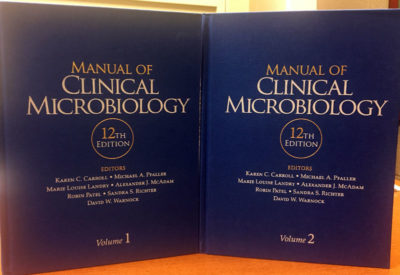
Earlier this year, the 12th edition of the Manual of Clinical Microbiology, considered the most comprehensive textbook on clinical microbiology (dubbed the "bible of clinical microbiology" by many), was published. Remarkably, every faculty member in the Division of Microbiology contributed to this publication, a testimony to their scholarship and broad-based medical knowledge. Karen Carroll, MD, was not only the editor-in-chief of Volume 1, but she co-authored three chapters. Patricia Simner, PhD, Sean Zhang, MD, PhD, Nicole Parrish, PhD, and Alexandra Valsamakis, MD, PhD, each contributed chapters within their areas of expertise, namely, Gram-negative resistance and susceptibility testing, hyaline fungi including Fusarium, detection and staining of Mycobacterium, and Hepatitis C, respectively. Other JHU contributors include Isabella Martin, MD, former fellow in Medical Microbiology and currently a faculty member at Dartmouth, and Michael S. Forman, MS, who coauthored the Hepatitis chapter with Dr. Valsamakis. Congratulations to the faculty in the Division of Medical Microbiology for this wonderful accomplishment.
Dr. Anne Le and her team's research find neurotransmitter helps aggressive tumors spread
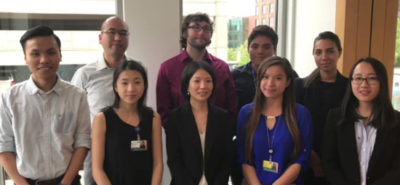
New research, led by Dr. Anne Le, has looked at human cancer cells implanted into mice, human tumor samples, and other assays in an attempt to better understand what drives the spread of certain aggressive cancers. Results indicate that many aggressive, or higher-grade, cancers contain higher levels of one specific neurotransmitter. Dr. Le also added that NAAG serves as an important reservoir to provide glutamate to cancer cells through GCPII... read full article here.
Related links:
Watch a video of Dr. Anne Le and her team explaining their research finding chemical 'messengers' responsible for cancer progression.
Hopkins researchers ID neurotransmitter that helps cancers progress.
Strockbine Wins School of Nursing Research Award
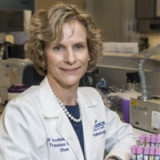
Val Strockbine RN, MSN is the Transfusion Safety Officer for The Johns Hopkins Hospital and is also pursuing a Doctorate of Nursing Practice at The George Washington University. As a part of her doctoral work, Val undertook a project at Johns Hopkins to reduce the number of unnecessary type and screen tests that are ordered on patients who already have a valid type and screen on file in the blood bank. Working with Dr. Eric A. Gehrie, medical director of the blood bank, as well as two mentors from George Washington University (Dr. Cathie E. Guzzetta and Dr. Quiping (Pearl) Zhou), Val implemented a clinical decision support system that enhanced the Epic module used to order the type and screen test with a display of the date and time that the current test expires. Providers could still choose to order the type and screen if they felt it was indicated, and the blood bank processed all specimens that it received. Importantly, this intervention led to a 16.7% reduction in the number of unnecessary type and screen specimens sent to the blood bank. This difference was statistically significant (p<0.001), was associated with an absolute reduction of 618 vials (approximately 3 liters cumulatively) of blood sent (unnecessarily) to the lab, and is estimated to result in a $142,612 annualized savings to the hospital. Within Johns Hopkins, the Department of Medicine is working with Val and Dr. Gehrie to identify additional ways to reduce unnecessary type and screen phlebotomy performed on adult inpatients.
On April 10th, Val presented a poster summarizing this project, titled, "Reducing unnecessary phlebotomy testing using a clinical decision support system" at the George Washington University Heath & Medicine Research Day. Her poster won 1st prize within the school of nursing. The poster as well as her Doctoral thesis will be archived permanently within the George Washington repository and she is working with Dr. Gehrie to prepare a manuscript for a peer-reviewed journal. Her work is timely, as her poster concluded "in this era of precision healthcare, the upshot of ordering the right test, at the right time, for the right reason can reduce cost, reduce waste, and improve quality and satisfaction for patients". Within Johns Hopkins, her work has been presented to patient blood management experts participating in the Blood Management Clinical Community. She will graduate from her doctoral program in May, 2019. Congratulations, Val!
Congratulations, Dr. Aaron Tobian!
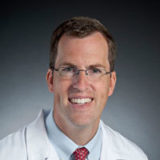
Aaron Tobian, M.D., Ph.D. was inducted into the American Society for Clinical Investigation (ASCI). ASCI is one of the nation's oldest and most respected medical honor societies. It is made up of more than 3,000 physician-scientists from all medical specialties who are elected for outstanding scholarly achievements in biomedical research. Aaron joins Kathleen Burns (elected 2018), Charles Eberhart (elected 2010), and T.C. Wu (elected 2002) from our department.
Congratulations, Dr. Lim!
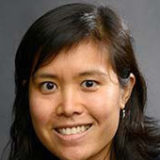
We are proud to announce that Yiting Lim, PhD, a 2014 graduate of the Graduate Program in Pathobiology, has been named a AACR NextGen Star by the American Association for Cancer Research. Currently a postdoctoral fellow in the Dr. Andrew Hsieh Laboratory at the Fred Hutchinson Cancer Research Center, Dr. Lim is working with what is known as the 5-prime untranslated region, or 5'UTR, in messenger RNA. Yiting presented her work at the annual AACR meeting on April 3, 2019 in Atlanta, GA.
Click here for more details.
Congratulations, Areli!

Pathobiology graduate student, Zoila Areli Lopez Bujanda, under the mentorship of Dr. Charles G. Drake, was presented the 2019 AACR-Prostate Cancer Foundation Scholar-in-Training Award for her abstract entitled "Androgen regulated IL-8 expression in prostate cancer: Insights into tumor cell mediated immunosuppression" in a poster session entitled "Suppressive Myeloid Cells" at the Annual AACR Meeting in Atlanta, GA on Monday, April 1, 2019. Click here for more details.
Areli was also presented with the School of Medicine Young Investigators' Day Mette Strand Award for the above-mentioned outstanding abstract and was celebrated at the annual awards ceremony on April 9, 2019. Click here for more details.
USCAP 2019

We had another wonderful reception at the 2019 meetings of the United States and Canadian Academy of Pathology in National Harbor, Maryland. The alumni of the Department along with current residents and faculty enjoyed meeting with each other and catching up on what is going on in Pathology and in life. Many of our trainees also presented research findings at the many poster platforms throughout the meeting which took place from March 16-22, 2019. Also of note: Congratulations to Dr. Laura Wood on winning The Ramzi S. Cotran Young Investigator Award at this year's meeting.
A Visit to Meharry Medical College
On March 25, 2019, a group from our department, led by Drs. Annika Windon and Marissa White, visited Meharry Medical College in Nashville Tennessee. Dr. Windon gave a wonderful presentation on careers in pathology and on the Department of Pathology at Hopkins, and Dr. White followed with sobering statistics on the percentage of underrepresented individuals in medicine. Drs. Juan Troncoso and Ralph Hruban joined the team from Hopkins. It turned out that one of the Meharry students, Ashanata Brady, attended the same grade school and high school as Dr. Hruban. A small world!
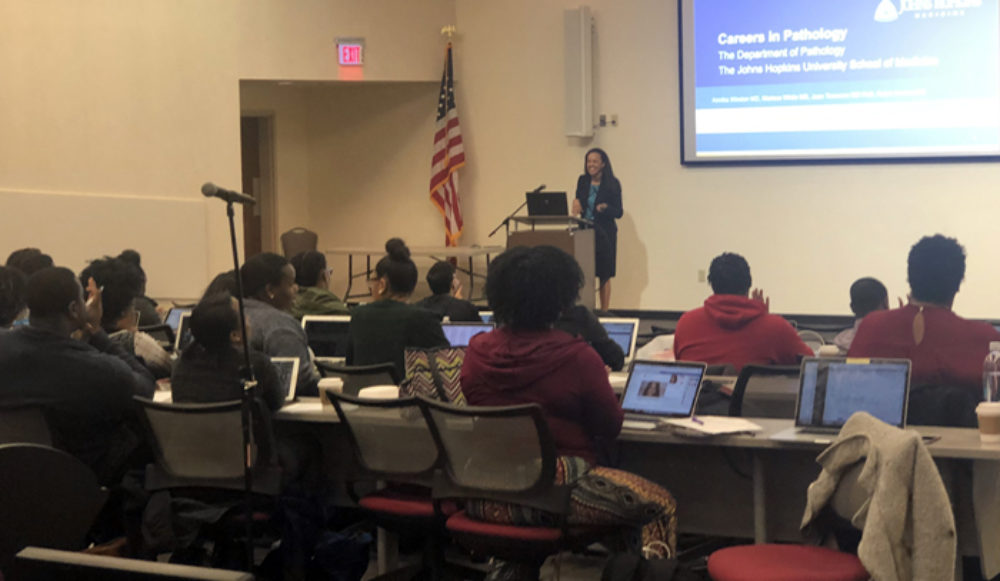
Howard University College of Medicine Residency Fair
On February 23, 2019, Drs. Alisha Ware, Annika Windon, Kevan Salimian, Tricia Murdock, and Lysandra Voltaggio represented our department at the Annual Howard University College of Medicine Residency Fair. The event serves to introduce medical students from Howard University and the mid-Atlantic region to various residency training programs and specialties. Our team from Hopkins answered questions from several interested medical students and provided information on various rotations in Pathology at Hopkins. The event was well-attended with over 50 residency programs represented, and our team had lively discussions with many enthusiastic medical students.
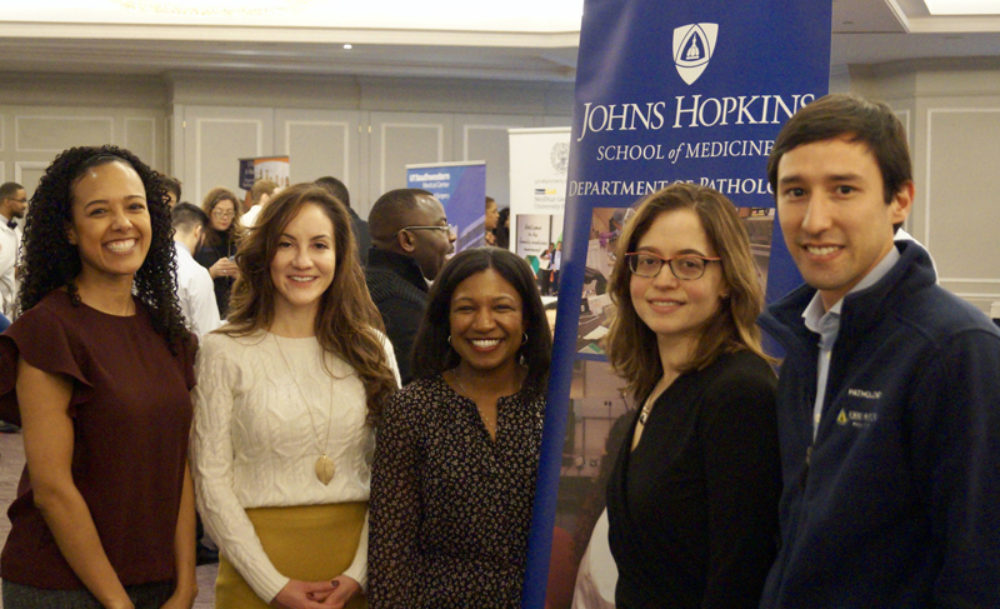
Congratulations, Byung-Hak Kang (BK)!

We are proud to announce that Byung-Hak Kang, Ph.D., a 2016 graduate of the Graduate Program in Pathobiology, along with collaborators, is co-first author on a paper published in Cancer Cell titled: "Aging-like Spontaneous Epigenetic Silencing Facilitates Wnt Activation, Stemness, and BrafV600E-Induced Tumorigenesis".
Byung-Hak Kang was raised in Seoul, South Korea. He received his Doctorate in Veterinary Medicine from Seoul National University in February 2007. After graduation, he went to Paraguay and spent three years there on behalf of the Korean Official Development Aid Program. Byung-Hak taught veterinary pathology to students and led a disease surveillance program on bovine brucellosis and tuberculosis at the Universidad Nacional de Asunción. From that teaching and research experience, he wished to pursue an academic research career. Through the Johns Hopkins Pathobiology Graduate Program, he joined the world-renowned epigenetic research group in the laboratory of Stephen Baylin, M.D., studying epigenetic changes in early tumorigenesis of colon cancer. Byung-Hak received his doctoral degree from the Johns Hopkins Pathobiology Graduate Program in December 2016. He is currently training within the Veterinary Comparative Pathology Residency Program in the Department of Molecular and Comparative Pathobiology at Johns Hopkins
Way to go, BK, keep up the great work!
Congratulations, Lionel Chia!

Congratulations to Lionel Chia for his abstract titled: "HMGA1 induces the HOXB13 developmental gene to drive tumor progression in androgen receptor negative, castrate-resistant prostate cancer", Lionel Chia will receive the AACR-Bristol-Myers Squibb Scholar-in-Training-Travel Award to attend the 2019 AACR Annual Meeting, taking place March 29 - April 3, 2019 in Atlanta, GA. Scholar-in-Training Awards are competitive and are presented to those with high-quality abstracts and applications from a large candidate pool.
Lionel is a 4th year PhD student in the Graduate Program in Pathobiology under the mentorship of Dr. Linda Resar, whose laboratory focuses on studying molecular mechanisms leading to cancer, blood diseases, sickle cell anemia, hemophilia and other coagulopathies. Lionel is studying the role of the chromosomal architectural protein HMGA1 in prostate and pancreatic cancer. He hopes that by understanding more about HMGA1, he would be able to develop additional therapies against HMGA1 and its associated pathways to treat cancer. Outside of the laboratory, Lionel's interests include playing his guitar, running, and spending time with friends.
Nice work, Lionel for being recognized as an outstanding young investigator!
Advance in Kidney research
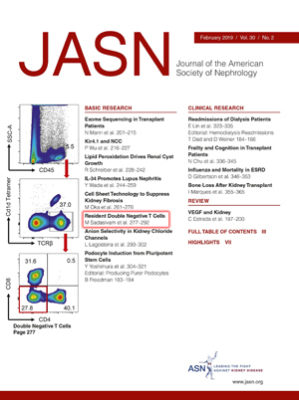
Most of our information about adaptive immune cells is derived from studying T and B cells in secondary lymphoid organs and peripheral blood. Consequently, very little is known about lymphocytes residing in non-lymphoid tissues. Dr. Mohanraj Sadasivam in Hamad's and Rabb's Laboratories has been studying a unique subset of alpha/beta T cells that lack expression of both CD4 and CD8 coreceptors and referred to as double negative (DN) T cells in the kidneys of the mouse model of ischemic reperfusion injury. He often examined the relevance of his mouse findings using kidney biopsy samples from patients. He published his recent findings in the February issue of the Journal of the American Society of Nephrology (JASN-the #1 ranked kidney journal). The findings were highlighted ON THE COVER page of the February issue.
Significance of the study: Understanding how each immune cell type functions in the kidney is necessary to develop new immunotherapies for cell-mediated kidney diseases, including transplant rejection, AKI, and GN. CD4- CD8- double-negative (DN) T cells are a significant kidney T-cell subpopulation that is anti-inflammatory and protective during ischemic AKI. However, little is known about the role of various MHC class I and II molecules in regulating their function. The new study demonstrates that mouse kidney DN T cells have IL-2-dependent proliferation, and further identified two subsets of kidney DN T cells: a classical MHC class I-dependent NK1.1+ subset and an MHC-independent programmed cell death protein-1 receptor (PD-1+) subset that is highly responsive to ischemia-reperfusion injury. PD-1 is an immune checkpoint inhibitor on T cells and the presence of this subset in human kidneys suggest a clinical importance of this unique T-cell population in possibly ameliorating inflammation in kidney insults.
Dr. Samuel Charache
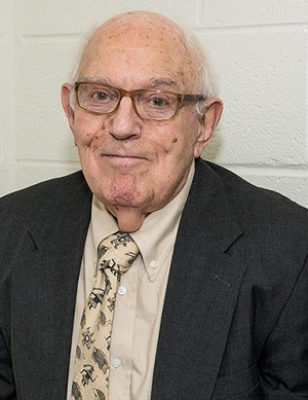
Samuel Charache M.D., former director of the Hematology Laboratory in the Department of Pathology died on January 29, 2019. He was emeritus professor of Medicine and Pathology and was internationally known for his work in hemoglobinopathies. He was a 1955 graduate of New York University and completed training in internal medicine and hematology. For more than 62 years he was married to Dr. Patricia Charache. Since the early 1960's this couple, as prominent faculty members, contributed significantly to our patients and to the Johns Hopkins University School of Medicine.
One of Sam's many contributions was improving the medical management of sickle cell disease. In 1995 along with co-investigators he performed the primary trial of using hydoxyurea in preventing sickle cell crisis. At the time the Director of the National Heart, Lung, and Blood Institute (NHLBI) stated that this was the first major improvement in the prevention of sickle cell crisis. Since this discovery thousands of both children and adults with sickle cell disease in the United States and around the world have benefited. Sam was the author of 155 papers and was an emeritus member of the Society of Clinical Investigation.
A longtime resident of Sulgrave Avenue in Mount Washington, and later Towson he enjoyed travel and cherished his daughter and 4 grandchildren. He was a strong supporter of Doctors Without Borders.
Hopkins Pathology #1 in NIH Funding for 2018
The Blue Ridge Institute released its 2018 rankings of NIH funding to US medical schools, and the Department of Pathology here at Hopkins once again is recognized as the #1 funded pathology department! This makes the department #1 in NIH funding for 11 of the last 12 years. In addition, Sharon Nachman, Susan Eshleman, Ie-Ming Shih and TC Wu were among the top 35 funded pathologists in the US.
From fighting HIV in Africa, to cancer in the inner city, our faculty are dedicated to impactful science.
| Rank | Name | Pathology |
|---|---|---|
| 1 | ohns Hopkins University | $49,831,627 |
| 2 | University of Pennsylvania | $36,243,072 |
| 3 | Washington University | $33,474,950 |
| 4 | Columbia University Health Sciences | $27,804,459 |
| 5 | University of Washington | $27,567,071 |
| 6 | Emory University | $26,650,371 |
| 7 | University of Michigan at Ann Arbor | $25,407,841 |
| 8 | Stanford University | $22,491,142 |
| 9 | New York University School of Medicine | $20,132,370 |
| 10 | Case Western Reserve University | $19,741,057 |
New Ovarian Tumor Pathology app is in the iTunes store!
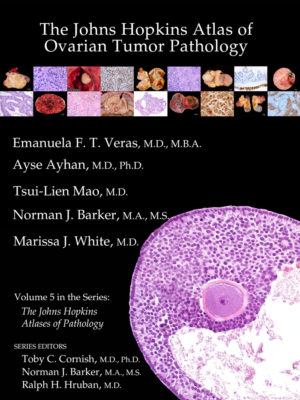
We are pleased to announce the release of volume 5 in the series of iPad Apps we have created on tumor pathology! Drs. Emanuela F. T. Veras, Ayse Aysan, Tsui-Lien Mao, and Marissa J. White, together with Mr. Norman J. Barker created the Johns Hopkins Atlas of Ovarian Pathology.
This unique app provides an easily accessible atlas with numerous images on each specific entity. Common and rare entities are documented as well as variations on every neoplasm. Succinct, explanatory descriptions are provided that aid the novice and experienced pathologist navigate ovarian pathology. Although the focus of this work is on neoplastic ovarian lesions, we have also included selected examples of non-neoplastic entities and normal ovarian structures that are important to recognize.
This app, available for the iPad only, follows the format presented in previous atlases of this series. It is composed of four modules: an interactive teaching algorithm, a searchable image atlas, an image-based quiz, and a flash card module.
The image atlas contains over 1600 high resolution stunning color images with expertly authored captions. These microscopic, macroscopic and radiographic images can be viewed together or separately, and two entities can be compared, side-by-side. The atlas can be viewed by diagnosis or by features (these features re-enforce the diagnostic features used in the algorithm), and the atlas can be searched using a key word search. You can create your own albums and add images you select from the atlas to add to these albums. The flash cards module allows you to view a randomly generated assortment of images from the image bank and subsequently view the diagnosis and caption by simply "flipping" the card over.
For the teaching algorithm, the authors present the reader with their general approach to the challenging mucinous tumors of the ovary. This module consists of sequential steps, including approach to the gross (laterality/size)/microscopic characteristics (stratified/non-stratified epithelium) and immunohistochemical profiles of primary and the most common secondary mucinous tumors to the ovary, each step prompting the selection of one out of two presented options, until a final diagnosis is reached.
This App, for iPads only, is available in the iTunes store. Enjoy!
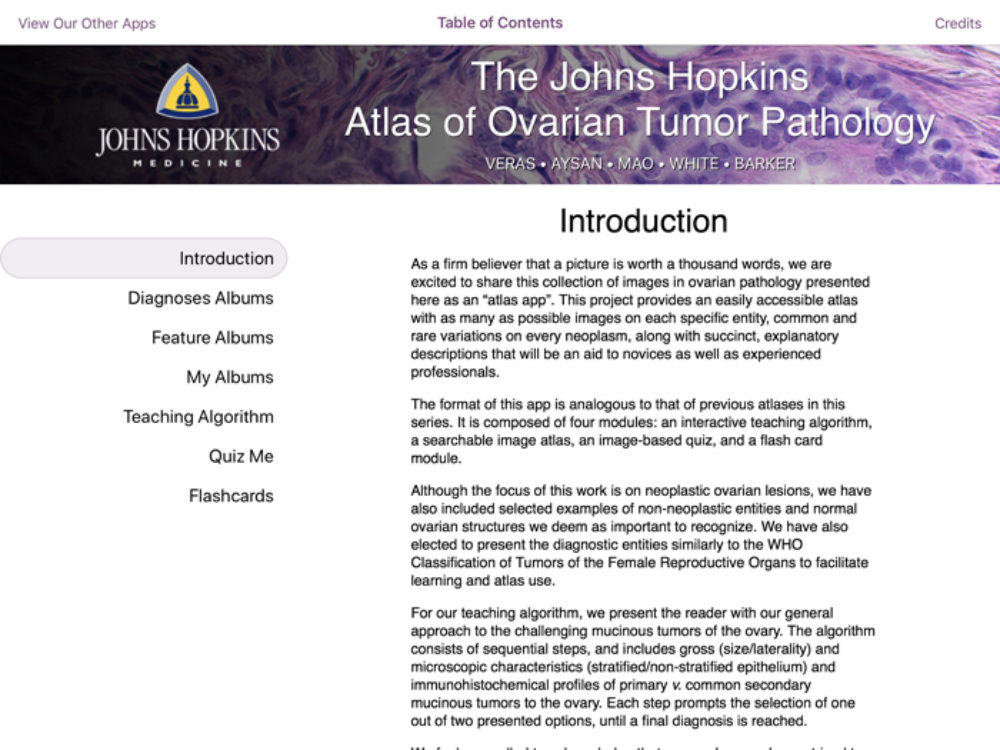
Congratulations, Carli Jones!
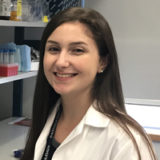
We are proud to announce that Carli Jones, a 2nd year graduate student in the Pathobiology Graduate Program, along with collaborators, has recently had a paper published in the International Journal of Molecular Sciences titled: "Short and Long-Term Changes in Social Odor Recognition and Plasma Cytokine Levels Following Oxygen (16O) Ion Radiation Exposure".
Carli is from Hillsborough, New Jersey and received her Bachelor's of Science in Biology with a minor in Bioengineering from Lafayette College in spring 2017. At Lafayette, Carli worked with Dr. Robert Kurt on projects involving the TLR4 signaling pathway. Since matriculating in the Pathobiology program in fall 2017, she joined the lab of Dr. Karen Sfanos and is studying the effects of radiotherapy for prostate cancer on the GI microbiome. In collaboration with Dr. Sfanos and Dr. Catherine Davis, she was also awarded a seed grant from Space@Hopkins to study the effects of cosmic radiation on the gut microbiome, and the effects of the radiation on the gut-brain axis. She is serving as the VP of Public Relations for the School of Medicine's Graduate Student Association for the 2018-2019 school year. In the future, Carli aspires work for NASA and study the effects of spaceflight on the human body, particularly in the areas of immunology and the gut microbiome. In her free time, Carli enjoys baking, dancing, and fitness. She has also fostered five dogs through City Dogs Rescue since moving to Baltimore.
Keep up the great work, Carli!
Dr. T.C. Wu elected as Fellow of the American Academy of Microbiology

Congratulations to Dr. T.C. Wu, Director of the Division of Gynecologic Pathology, for his election to Fellowship in the American Academy of Microbiology (AAM). The AAM is an honorific leadership group within the American Society for Microbiology (ASM), which is the world's oldest and largest life science organization. The AAM recognizes scientists for their excellence, originality, leadership, and outstanding contributions to the microbiological sciences.
Dr. Wu has dedicated his career to characterizing the molecular pathogenesis of HPV and developing therapeutic vaccinations to treat HPV-associated malignancies. He has been elected to AAM for his many translational contributions in the fields of microbiology and gynecologic pathology. Dr. Wu will be recognized during the annual ASM Microbe 2019 conference in San Francisco in June along with all newly elected fellows.
2019 Red Cross Blood Drives

There are many Red Cross Blood Drives scheduled for the Hopkins community-across all Hospitals and all locations-throughout 2019. Please click the image above to see the entire list. Please consider a donation to save lives.
Congratulations, Dr. Aaron James!
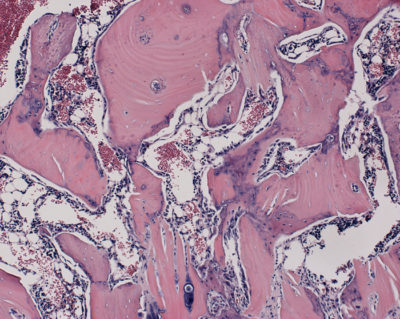
Congratulations to Dr. Aaron James and the James Lab on discovering the signal that drives stem cells to form new bones! In Dr. James' own words,
"The mechanisms by which progenitor cells commit to adopt a bone cell (osteoblast) or fat cell (adipocyte) fate are not well understood. Leveraging prior transcriptome studies, our group identified the matricellular protein WISP-1 as integral to this decision making process. WISP-1 is highly expressed in the perivascular niche, positively regulating bone formation upon cell transplantation. Overall, our findings suggest that WISP-1 signaling upregulation may be of future benefit in cell therapy mediated bone tissue engineering, for the healing of bone defects or other orthopaedic applications." Dr. James
Diagnosis of Endometrial Biopsies and Curettings
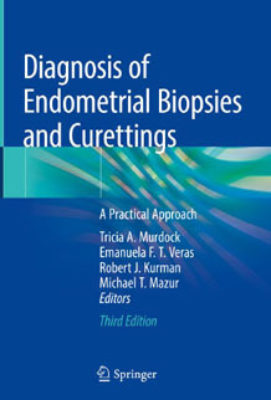
The 3rd edition of Diagnosis of Endometrial Biopsies and Curettings was recently published. Congratulations to Drs. Tricia Murdock, Emanuela Veras, Robert Kurman and Michael Mazur! This book entails a comprehensive review of endometrial pathophysiology, i
The New PathWays is out!
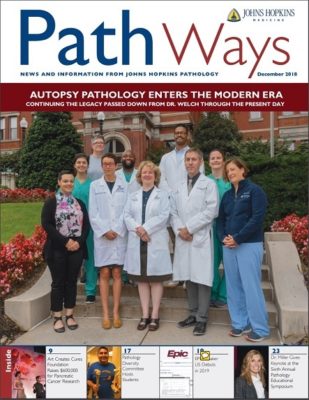
PathWays is our annual departmental newsletter. Read about developments, news and people in the department! Read the PathWays. You can also view the archive of previous PathWays.
